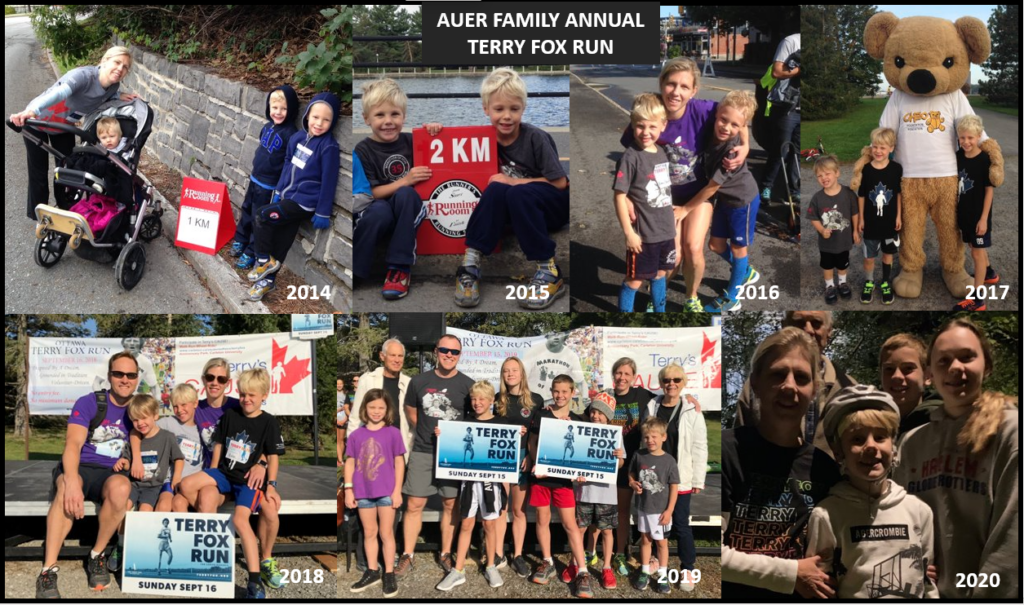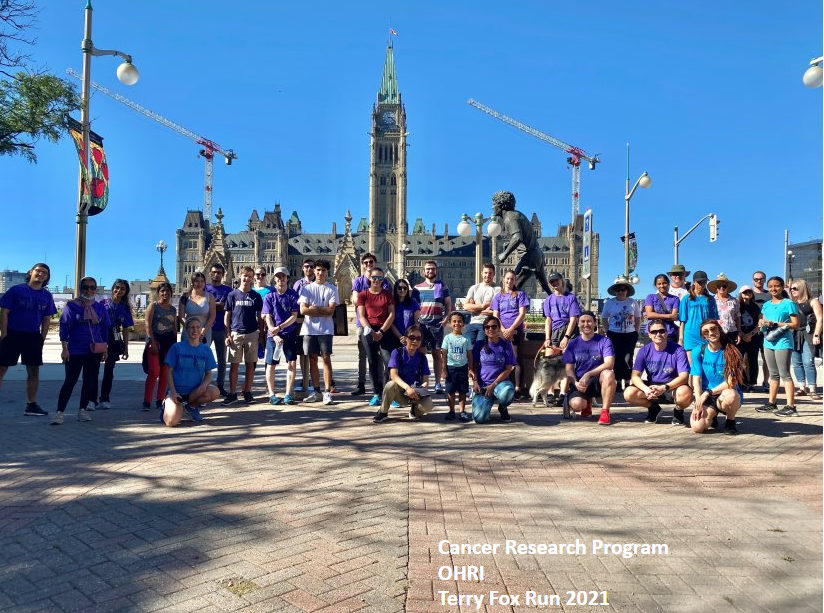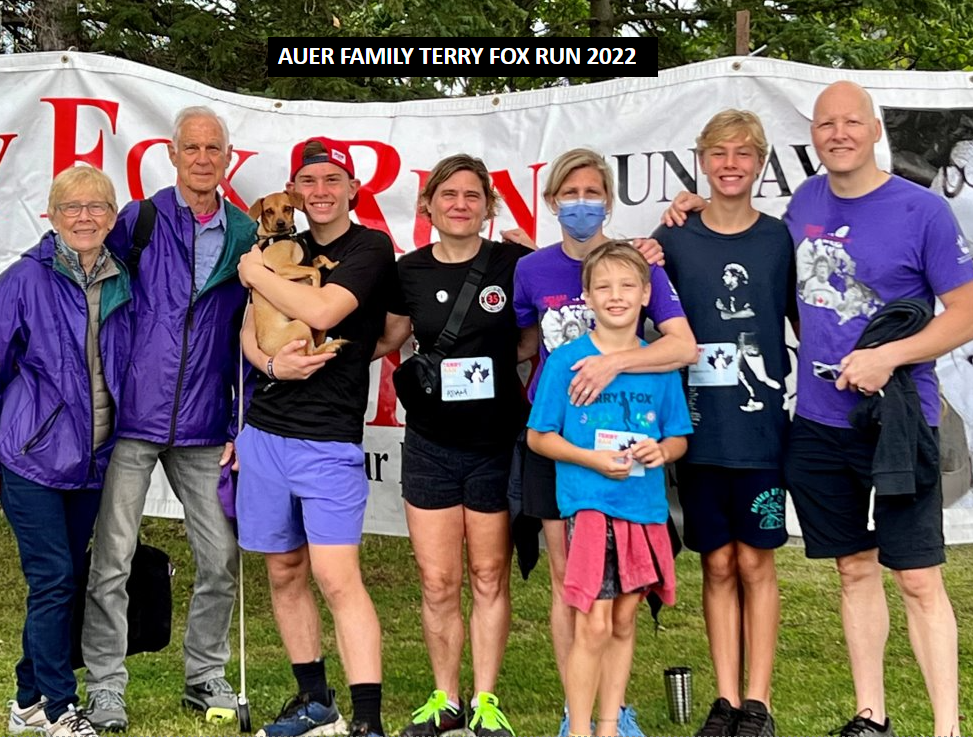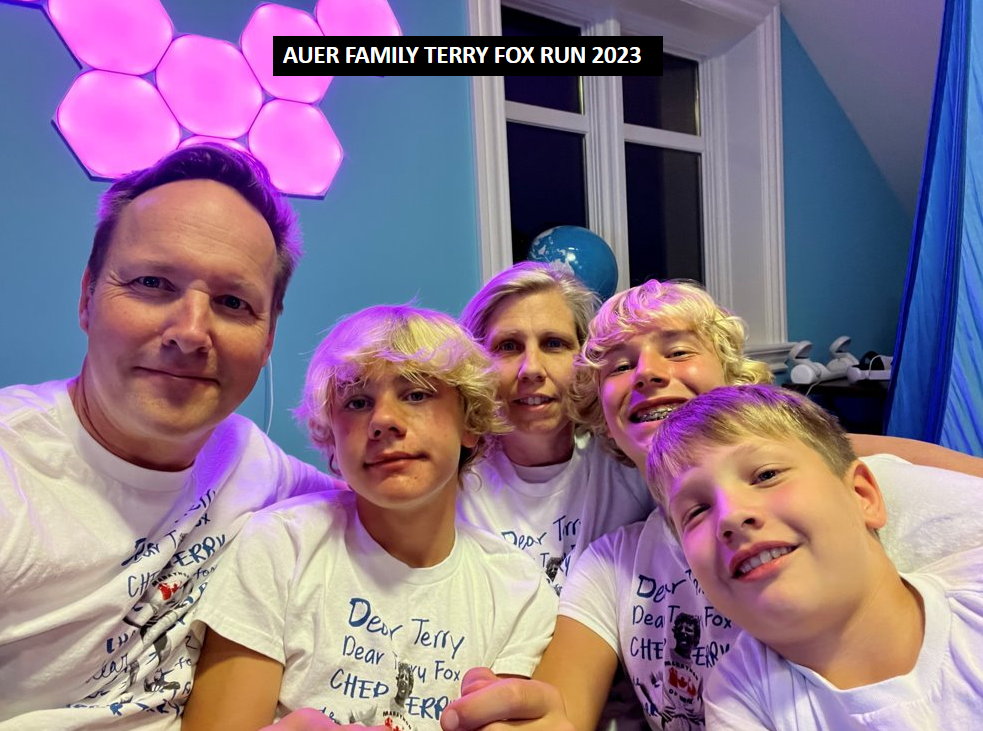
It was only a glimpse she caught, standing on the side of the Trans-Canada Highway as it curved along Lake Superior, but since then, Terry Fox has remained a source of inspiration for Dr. Rebecca Auer. His vision and determination helped motivate her to where she is today — an award-winning cancer clinician-scientist.
Dr. Auer combines revolutionary cancer research with hands-on patient care every day in her role as Executive Vice-President of Research and Innovation at The Ottawa Hospital and CEO and Scientific Director at The Ottawa Hospital Research Institute.
As a surgeon, Dr. Auer sees with clarity that, while surgery may be the best chance for a cure in most cancers, patients are particularly vulnerable to both infections and cancer recurrence in its aftermath, in large part because the immune system is suppressed in the postoperative period. Dr. Auer’s research program is focused on understanding the mechanisms behind this effect and reversing them with innovative therapies.
In recognition of her practice-changing research, Dr. Auer has been named the 2023 recipient of the Chrétien Researcher of the Year Award.
Keep reading to learn about her childhood stint at CHEO and an alarming late night in the lab.
Q: What were your early years like?
A: Ottawa has always been my home; I grew up here, went to high school here, and went away for my undergrad in Toronto and medical school in Kingston before coming back to Ottawa for my surgical residency.
I wasn’t fantastically good at school when I was younger. I had a learning disability related to writing, called dysgraphia, but I was good at math. My mother, a psychologist by training, would say, “If you’re good at math, do math, and you’ll figure out the writing stuff later.”
We were super early adopters of computers, so I had an Apple computer by the time I was six, which was unusual. Being able to work on the computer took away a lot of the challenges of dysgraphia.
Q: What made you decide to pursue a career in medicine?
A: In high school, I really enjoyed sciences, especially biology. When I was 15, I was hospitalized for about three months with a bone infection in my knee called osteomyelitis. Even though I was stuck in my room on bed rest, I loved CHEO. I met a lot of interesting kids my age, most of whom had way more significant problems than me, but that didn’t seem to matter. We played practical jokes on the nurses, snuck ice cream from the kitchen, and laughed together after lights out. At a time when the only thing that mattered in high school was being cool, I found a place where people cared only about the things in life that really matter. I wanted to work in that kind of environment.
Q: How did you wind up in oncology, specifically?
A: When I first got into to medical school, I wanted to be a neurologist because I was fascinated with the way the brain works … but in practice, it wasn’t what I thought. Then, I considered obstetrics and gynecology because I enjoyed the operating theatre. In the end, I did a rotation in general surgery and it was love at first sight. It wasn’t rational, but I knew. Maybe it was the adrenaline of looking after sick patients, the diversity of different types of diseases, or the incredible feeling you get when you save someone’s life by fixing a hole in the intestine or stopping life-threatening bleeding. Every day would start at 5:30 a.m. and end after 6:00 p.m., and I never once looked at my watch. It was just a really intense experience.
When I got into surgical residency, I had no idea what I wanted to specialize in. I thought maybe trauma or even rural surgery, but I found I was more interested in molecular biology than the other things I was supposed to be studying, like hernia repair techniques or the technical approach to the inflamed gallbladder. I decided to do a masters of science (MSc) in molecular genetics during my residency, but no one really wants to take a surgical resident for a one-year MSc if they’ve never done any work in the lab. One day, my mentor, Dr. Hartley Stern, who was the head of the Ottawa Regional Cancer Centre, overheard me complaining and called senior cancer researcher, Dr. John Bell. Suddenly I was doing a year in his renowned translational cancer therapeutics lab.
I had so little experience working in a lab that I got teased a lot. Once I threw away a DNA gel because I thought I had cut the piece of DNA in half. I remember Dr. Bell joking that even a surgeon as skilled as me could not cut a piece of DNA with a scalpel! DNA is so small you have to use enzymes to cut it. I also used to keep the hours of a surgical resident in the lab, and one late night, I recorded a massive radiation reading with the Geiger counter. I was sure there had been a major radioactive spill. I called the postdoctoral fellow, who asked if I was pointing it at the fridge with the big radioactivity symbol on it … where we kept all our radioactive substances. When I admitted that was true, he said “Yes, yes, the fridge is full of radioactivity. Now please put the Geiger counter down and go home to bed!”
“I realized what a privilege it is to look after cancer patients.”
— Dr. Rebecca Auer
Being in the lab was an amazing experience, and in the end, I decided to go into cancer surgery so I could have a research program in cancer biology. It was only later, during my senior residency and fellowship at the Memorial Sloan-Kettering Cancer Centre (MSKCC) in New York, that I realized what a privilege it is to look after cancer patients. It is their courage, resilience, and ability to show gratitude, even during some of the most trying times, that I find so remarkable.
Q: What is the focus of your research?

A: My research program is focused on understanding how surgery impacts the immune system. We know the immune system is highly effective at destroying cancer cells, but in the aftermath of surgery, the immune cells are almost completely dysfunctional for at least a week and up to a month or more. The research from our lab suggests that this postoperative immune suppression is responsible for cancer recurrence after surgery.
As a surgeon, I take cancers out, but I don’t change the biology of disease. If the cancer is completely contained and there are no cancer cells floating in the blood stream or implanted in distant organs, the patient can be cured. Unfortunately, for many patients that is not the case, and months to years later, those cancer cells — the ones that were present at the time of surgery floating around undetected — grow into new tumours. The Auer Lab has hypothesized that if you reverse or prevent this immune suppression and have a strong and functional immune system after surgery, it could clear these left-over cancer cells and prevent the patient from getting a recurrence. We have demonstrated this is true in mouse models, and now we need to show it can be achieved in cancer surgery patients. We do wet-lab research to understand why the immune cells are dysfunctional and then experiment with different “perioperative” immunotherapies, given around the time of surgery, to see which work the best and then try them in clinical trials.
Q: You are being recognized for an important clinical trial published in one of the world’s top medical journals. Can you tell us a little bit about this trial?
A: PERIOP-01 was my very first clinical trial, and like most things in my life, I reached a bit too high. It was a national, multicentre randomized controlled trial, designed to change practice. Since then, we have done PERIOP-02 to PERIOP-06, all of which have been smaller scale.
The trial was looking at whether perioperative administration of a blood-thinning drug, called tinzaparin, could help the immune system kill cancer cells following surgery for colon cancer and reduce cancer recurrence. Interestingly, the trial was negative, in that cancer recurrence was not lower in the group that got the tinzaparin, but what it did show was that you don’t need to give patients extended treatment with blood thinner after surgery to prevent blood clots. The trial was practice-changing, even if it wasn’t what we were hoping to see.
On a personal note, translating a preclinical finding, discovered in my lab, into a human clinical trial conducted in collaboration with my surgical colleagues across Canada, was a major accomplishment.
Q: How do you feel about receiving this award?
A: This award is a huge honour, especially when I look at the people who have won the award in the past. It’s hard to believe I’m in that category. I’m also very proud of getting this study published and finished — it was the monkey on my back for many years. Like all research, it was a team effort and I cannot thank the co-investigators, collaborators, and research staff enough for all their support. This is especially true of my co-principal investigator and senior author, Dr. Marc Carrier. He is an incredibly accomplished researcher and former recipient of the Chrétien Award. Working with Marc and his team was a highlight of this project.
Q: Why is research so important for the healthcare being delivered today at The Ottawa Hospital?
“Never has it been more obvious than in cancer today, but research is care.”
— Dr. Rebecca Auer
A: In many cases, research is the best option for care, or the only option. The line between research and clinical care is increasingly difficult to draw clearly in the sand, and it is time to recognize we are creating more problems by trying to keep them separated.

When it comes to rapidly advancing technologies, like molecular testing or personalized therapies, they are moving so quickly from bench to clinical studies that if we don’t embrace research as part of care, we are doing our patients a disservice. Every patient deserves an opportunity to participate in research, and as an academic hospital, it is our responsibility to provide those opportunities to patients. Research can fuel hope for patients by providing a new or alternative treatment for them or the potential to help others in a similar situation in the future.
Q: What’s something people might not know about you?
A: I think most people know Terry Fox is a hero to me. There are so many facets to his story. He had a bold and audacious vision to run across Canada on one leg to raise money for cancer research — a vision which he articulated the night before his amputation for cancer. He was steadfast in his determination, having run halfway across Canada in training miles before he ever dipped his toe in the Atlantic Ocean. He inspired others to join his cause and be part of something bigger than themselves. As the mother of three boys, I want them to know Terry’s story and understand the value of working hard for something you believe in. Every September, for the past decade, we have participated in the Terry Fox Run as a family, raising over $120,000 for cancer research.

My one claim to fame is that I got to meet Bruce Springsteen at a fundraiser when I was the Chief Fellow at MSKCC in New York City. At the time, his long-time friend and E Street Band member, Danny Federici, was being treated for metastatic melanoma. I told Bruce about Terry Fox, his legacy in Canada, and how much research had changed cancer care since his death in 1981. Although Bruce probably didn’t remember any of it, I like to think that maybe Terry’s story gave him hope.




